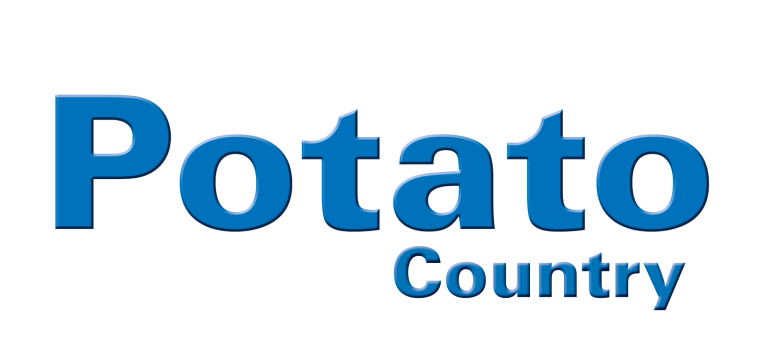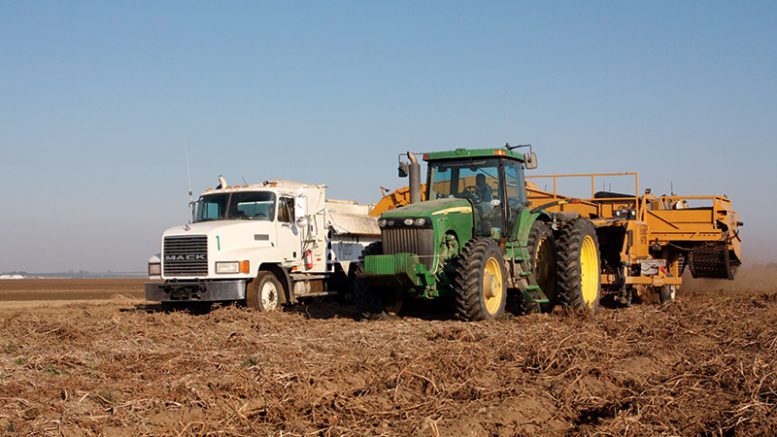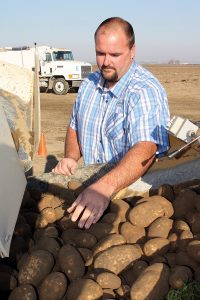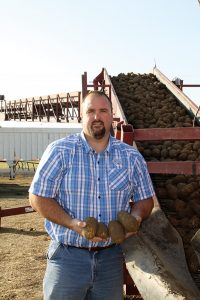Story and photos by Denise Keller, Editor
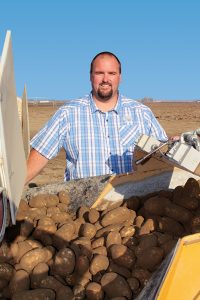
A partner in Schneider Farms, Grant Morris is active with the Washington State Potato Commission and National Potato Council.
They say if it’s not broken, don’t fix it. With that in mind, there isn’t much Grant Morris plans to change as he prepares to take over Schneider Farms in the near future. A conservative approach to business has served the Pasco, Washington, farm well for more than 50 years. Going forward, Morris intends to stay the course while also keeping the farm in position to seize an opportunity when it comes along.
A Work in Progress
Grant Morris and Ed Schneider, partners in Schneider Farms, grow 1,600 acres of potatoes for the processing market. The acreage includes 750 acres of Ranger Russet, 600 acres of Clearwater Russet, 250 acres of Bintje and a small trial of Dakota Russet in 2018. Another 300 acres are planted in grass seed.
The farm’s potato program is effective, but never perfected. The growers are always fine-tuning growing practices from planting depth, seed spacing and hill shape to now spraying herbicide with a dammer diker as opposed to a ground rig or through the water. Recent changes in irrigation and fertilizer applications have improved tuber size and specific gravity.
With potatoes being such a highly managed crop, Morris tries to visit each field two to three times a week during the growing season. In addition to the usual soil, petiole and insect sampling done on the farm, Morris also began pulling his own samples based on heat units after the 2016 season. That year, temperatures were unseasonably high at certain stages of the crop’s growth, Morris recalls, and plants died early. Through the additional sampling, Morris hopes to be able to predict how the crop will react to heat in order to adjust management practices accordingly.
From weather conditions to cultivation, Morris keeps very detailed records of activity on the farm. This allows him to better understand what factors might have made a year particularly good or bad and helps him make better informed crop management decisions in the future.
“You can never know exactly what you did right. It’s much easier to know what you did wrong in a lot of cases, but I am able to look back at the end of the year and point to something as the reason we had a good crop or bad crop,” Morris explains. “I feel that if you have a good year and you don’t know why or you have a bad year and don’t know why, you’re lucky you did so well or didn’t do worse. I try to learn as much or more from a bad year as I do from a good year.”
Morris says he is still learning the nuances of growing baby potatoes. Schneider Farms’ Bintje potatoes are roasted and frozen through the specialty potato program the farm helped develop with Simplot in 2007. Since that time, the farm doubled the total yield and increased the usable size profile from 60 to 90 percent by changing the irrigation regime, refining the vine kill method and decreasing row spacing from 34 inches to 22 inches to improve uniformity. Growing baby potatoes is all about plants per acre and tuber set, Morris says. Sampling is intensive at the end of the season to achieve the desired size profile of 28 to 41 millimeters.

Grant Morris and Ed Schneider, partners in Schneider Farms, pin their potato-related travels on this map in their office.
An Important Job
Morris’ interest in research is useful on the farm and in his role with the Washington State Potato Commission (WSPC). Morris has been a WSPC commissioner since July 2017 and is a member of the research and government affairs committees. He also is on the National Potato Council (NPC) board of directors and the NPC environmental and legislative affairs committees.
The experience has given Morris a broader perspective of how operations on his farm affect sales, trade, processors and other market sectors. Serving on the WSPC is fun, and it’s important, he adds. He finds value in communicating the industry’s issues to lawmakers, and he sees commission-funded research directly benefitting growers.
“When I’m in a research meeting and helping select projects to get funded, I know that in five years, something is going to come out of it that will help me on the farm and help other growers. It makes me feel good to know that I’m making a difference and helping out,” Morris shares.
For example, Morris says, the WSPC recently worked through the Northwest Potato Research Consortium to secure an Agriculture and Food Research Initiative grant to fund research related to potato blemish diseases. Other priorities have included funding a study to reassess the water conditions of the Odessa sub-aquifer in the Columbia Basin, as well as lobbying to free up a USDA-ARS potato breeder position that was locked due to a hiring freeze. Nationally, the WSPC and NPC have been working to remove restrictions on potatoes in the school lunch and breakfast programs.
A Perfect Opportunity
Referred to by some in the industry as “Ed’s guy” and occasionally mistaken as Schneider’s son, Morris plans to buy out Schneider in the next couple years.
Morris has been with Schneider Farms since 2005 when his uncle introduced him to Schneider, whose family had been farming in Pasco since the 1960s and first planted potatoes in the mid-1970s.
“Ed was looking for a guy, and I was looking for a job,” Morris smiles. “It was as simple as that.”
Morris began managing the farm’s irrigation, but knew from the beginning that he wanted to be part of the business. After a few years, he became a partner. By design, he has been slowly taking over the day-to-day operations as Schneider nears retirement.
“Ed has been the reason I’ve gotten to where I am now. He’s given me the opportunities and helped me and encouraged me and showed me the way,” Morris says. “There aren’t many people in the industry like Ed. He’s very well respected. That has opened up a ton of doors for me. People know Schneider Farms.”
Schneider, a former WSPC chair and NPC president, has tried to lead by example, encouraging Morris to be active in industry leadership and to build connections with processors.
“Grant is bright,” Schneider says. “His work ethic is really good. He understands the ins and outs of this business. I have no doubt he’ll be successful.”
Looking ahead, the farm’s current program and business philosophy will be key to continued success, Morris says.
“I don’t have a whole lot to change. If you’ve been growing potatoes for 40 years like Ed, you’re doing something right,” he points out. “We try to stay away from the big risk, big reward for the most part, but we will try it when we feel we can do it successfully.”
“There’s no one way to do things. I don’t ever want to feel like I know it all because the fun part is learning it,” Morris continues. “I fully expect to be learning as many things about potatoes the year I retire as I did my first year on the farm.”
